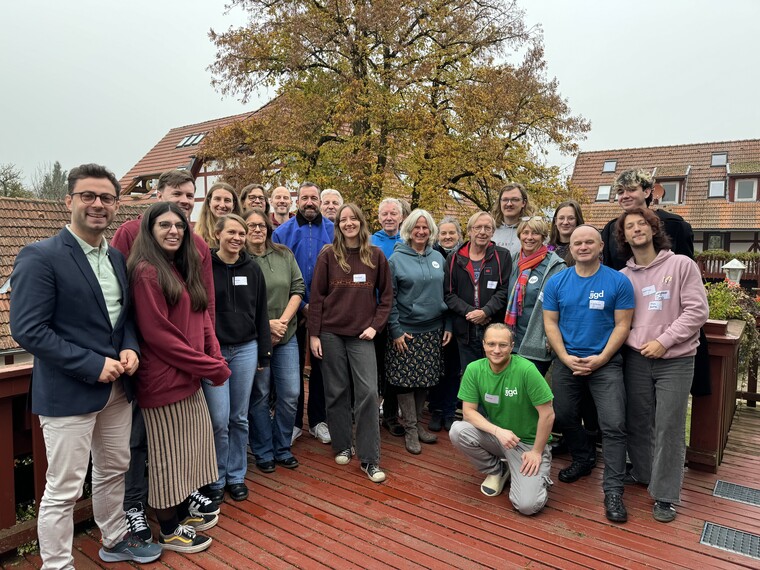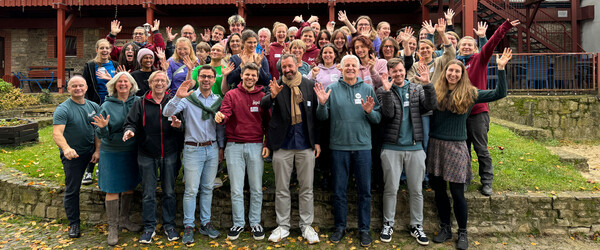The Association
The ijgd (Internationale Jugendgemeinschaftsdienste) is made up of a Federal Association and 14 associated Regional Associations in the federal states. Our organisation relies on the commitment of its many volunteers working together in teams, running seminars, being active in working groups, initiating projects, organising events or getting involved with shaping the organisation as a board member or in the Finance Commission.
The ijgd Board
The highest body of our organisation is the General Assembly. This meets once per year. Between meetings of the General Assembly, the Board represents the interests of the Association’s members and the Association itself.
Each office has its own Regional Board – and there is an additional Federal Board. There are a total of five Boards. Each director is a member of their Board. The Finance Commission advises and monitors the financial activities of the Boards and directors.
If you have any questions about the work of ijgd board members or would be yourself interested in becoming a board member, then get in touch with our Federal Board.

Federal Board
For the Federal Association
Edith Eike (1st Chair)
Helena Herold (2nd Chair)
Anselm König
Giorgi Mamulashvili
Managing director Katrin Bäumler
Delegates from the Regional Boards:
Django Kriszun
Silvia Kube
Lea Seiffert
Stefan Hilbert
Regional Board Berlin
For the Regional Associations of Berlin and Brandenburg
Egor Savin(1st Chair)
Ronja Ringleben-Fricke (2nd Chair)
Django Kriszun (Federal Delegate)
Ronald Haustein
Managing director Johannes Zerger
Regional Board Bonn
For the Regional Associations of North Rhine-Westphalia, Hesse, Rhineland-Palatinate/Saarland, Baden-Wurttemberg, South Germany
Silvia Kube (1st Chair)
Tim Romankiewicz (2nd Chair)
Alina Stodz
Aisha Jadidah Nakimbugwe
Dania Krause
Paul Bantelmann
Managing director Angela Krug
Regional Board Hildesheim
For the Regional Associations of Lower Saxony and Hamburg
Nina Farchau (1st Chair)
Lisa Freytag (2nd Chair)
Lea Seiffert (Federal Delegate)
Managing director Thorsten Blank
Regional Board Wismar-Halberstadt
For the Regional Associations of Mecklenburg-Western Pomerania, Saxony, Saxony-Anhalt, Schleswig-Holstein and Thuringia
Jana Wolfrum (1st Chair)
Stefan Hilbert (2nd Chair + Federal Delegate)
André Schirmer
Martin Bettermann
Sinica Hutzfeldt
Tarek Laufer
Michael Harms (als Geschäftsführer von Amts wegen)
Finance Commission
Constantin Piehler
:Diet Wimberg
Karin Bettermann
Torsten Weil
Werner Hesse
History
The first workcamps were organised by students in 1948 in order to help out with post-war reconstruction efforts, create international contacts in order to bring together former perceived enemies, and to seek out new democratic visions for a peaceful future. This initiative led to the creation of the "Internationale Jugendgemeinschaftsdienste (ijgd)" one year later.
What started with a small group of students in Hanover has since become a specialist charitable organisation that is active all over the world. A magazine produced for our organisation’s 60th anniversary provides a more in-depth look at our history (available in German only).

The ijgd Charter
I. Name, Location, Fiscal Year
1. The Association is named “Internationale Jugendgemeinschaftsdienste (ijgd) Bundesverein e.V.- Gesellschaft für internationale und politische Bildung.“
2. The Association is based in Berlin.
3. The fiscal year is the calendar year.
II. Purpose
1. The Association is an exclusively charitable organisation as defined in the German Tax Code under section “tax-privileged purposes”.
2. The purpose of the Association is the promotion of youth welfare, education, further training, an international mindset, tolerance in all areas of culture and international understanding as well as promotion of civic engagement in pursuit of the aforementioned charitable purposes.
3. The Association pursues the goal of making people of all ages aware of the conditions present in society so that they may use this knowledge to be able to make decisions and take actions autonomously within a democratic society as well as contribute to building an international understanding in order that we may enjoy a more peaceful world.
4. The Association fulfils the mission set out in its charter by organising and operating international community services, voluntary services, seminars and educational events which are intended to enable exchanges between people from different backgrounds and environments, to provide experiences that will help shape communities, and to provide help to others who need it.
5. The Association can, insofar as permitted by the “tax-privileged purposes’ section of the German Tax Code, hold stakes in educational institutions that are in line with its aims.
III. Altruism
1. The actions of the Association are based on altruism; its economic performance is not the primary concern.
2. The Association’s funds may be used exclusively for purposes according to this charter. Members receive no allowances from the Association’s funds.
3. No person may receive payments from the Association where such payments would be contradictory to the Association’s aims nor may any person receive disproportionate compensation from the Association.
IV. Membership
1. The Regional Associations of the ijgd are members of the Association. They do not have any voting rights.
2. A full member of the Association can be any natural person who actively works to achieve the goals of the Association. Full members are entitled to vote in meetings of the General Assembly.
3. A supporting member of the Association can be any natural person who is prepared to support the work of the Association financially. Supporting members may advise the General Assembly.
4. Honorary members are put forward by the Board and appointed by the General Assembly. Honorary members may advise the General Assembly.
5. Members may enter into an employment relationship with a Regional Association or the Federal Association and will receive appropriate remuneration for their duties that is subject to social security deductions. Voting rights and rights to elect and stand as a candidate in elections to the Board remain dormant for members who are employed by a Regional Association or the Federal Association and subject to social security deductions. Voting rights and rights to elect and stand as a candidate in elections to the Board are also made dormant for members of a Regional Association or the Federal Association who receive compensation or payment from the ijgd that exceeds the instructor’s allowance (Article 3 (26) German Income Tax Law) or the volunteer’s allowance (Article 3 (26a) German Income Tax Law).
6. Full members undertaking voluntary service with a Regional Association or the Federal Association in accordance with the Youth Voluntary Service Act or the Federal Voluntary Service Act and are considered in this capacity as employees subject to social security deductions have voting rights in the General Assembly. The rule under IV.5 does not apply in this case. The right to stand as a candidate in elections remains dormant for the duration of the voluntary service.
7. Membership of the Federal Association includes membership in all Regional Associations.
8. Membership applications are to be submitted in writing to the Board of the Federal Association. Outside of General Assembly meetings, the Board will decide on whether or not to approve applications from members. If the application is rejected, the applicant may lodge an appeal within a period of one month. The General Assembly will then make a final decision on the appeal.
9. Memberships according to IV. 1 are terminated by dissolution of the Association, refusal to open insolvency proceedings due to a lack of assets, or loss of charitable status.
10. Memberships according to IV. 2 to 4 are terminated by cancellation, removal from the list of members, expulsion, or death. Cancellations must be notified in writing to a member of the Board of the Federal Association. Cancellations of membership can only take effect at the end of a calendar year with a notice period of three months. A member can be removed from the list of members by the Board if they fail to pay their membership fee despite two warnings. The removal from the list of members must be notified in writing. If a member has severely violated the aims and interests of the Association, then the Board may submit a resolution to the General Assembly for the member to be expelled. Before the resolution is passed, the member must be given the opportunity to make a statement. Written statements by the affected person must be read out to the General Assembly. Exclusion of the member is effective from the time at which the resolution is passed. If the member is not present at the time the resolution on their exclusion is passed, then the Board must immediately notify them in writing. The written announcement of the resolution that has been passed must include the reasons for the exclusion. Termination of membership in the Federal Association also terminates membership in Regional Associations.
11. Fees are collected for members with memberships according to IV. 1 to 3. The amount and due date of the annual membership fee for memberships according to IV. 1 is decided by the Board. The amount and due date of the annual membership fee for memberships according to IV. 2 and 3 is decided by the General Assembly. Honorary members do not pay fees.
V. Organs of the Association
1. The organs of the Association are
the General Assembly
the Board
the Finance Commission
2. The General Assembly
2.1. The General Assembly must meet if required by the interests of the Association, and no less than every two years, and if one quarter of members request in writing for a meeting be held that states the purpose and reasons for the meeting.
2.2. A meeting of the General Assembly must be called in writing, e.g. by email, by the Board with a notice period of at least four weeks and the agenda for the meeting must be included with the announcement of the meeting. The notice period begins on the following day after the letter of invitation is sent. The date of the postmark/date of sending applies here. The letter of invitation is considered to have been delivered to the member once it has been sent to the last address provided by a member in writing.
2.3. Until two weeks before the start of the meeting, all members are permitted to submit requests in writing to the Board for additional items to be added to the agenda. The meeting organisers must update the agenda accordingly at the start of the meeting. Items for discussion may be added to the agenda at the start of the meeting. Changes to the charter, dissolution of the Association as well as the election and dismissal of board members can only be decided if motions for such are announced to members in the agenda.
2.4. During the meeting of members, each full member present has one vote, provided their right to vote is not currently dormant according to IV. 5. Honorary and supporting members do not have a right to vote. Votes are not transferrable to other persons.
2.5. As the highest decision making organ, the General Assembly is responsible for the following matters:
a) receiving the statement of accounts from the Board,
b) receiving the annual report incl. annual financial statement,
c) receiving the activity report from the Finance Commission,
d) appointment, dismissal and discharge of the Board,
e) appointment of the Finance Commission,
f) guidelines governing the work of the Association,
g) setting the amount of due date of membership fees for members as defined in IV. 2 and 3,
h) passing resolutions regarding changes to the charter and dissolution of the Association,
i) determination of the rules and procedures within the ijgd,
j) appointment of honorary members.
2.6. All properly convened meetings of the General Assembly are able to hold binding votes regardless of the number of members present.
2.7. Decisions by the General Assembly are generally made by a simple majority of valid votes cast; abstentions are not considered. Changes to the charter and the dissolution of the Association require a two thirds majority of valid votes cast.
2.8. Minutes of General Assembly meetings are to be kept and must be signed by the 1st or 2nd chair and the keeper of the minutes.
2.9. The General Assembly adopts rules and procedures and election regulations.
3. The Board
3.1. The Board consists of
a) the 1st and 2nd chairs,
b) the managing director,
c) five delegates from the Boards of the Regional Associations,
d) up to two further people.
3.2. The Board as defined by Article 26 German Basic Law is
a) the 1st and 2nd chairpersons as well as
b) the managing director.
They provide judicial and non-judicial representation for the Association. Two board members of each board are jointly authorised as legal representatives.
3.3. The Board, as defined by V. 3.1a) and V. 3.1d) is elected by the General Assembly for a period of two years. Board members according to V. 3.1a) and V. 3.1d) may not also be board members of a Regional Association. The 1st and 2nd chairpersons are elected by the General Assembly is a separate election process. Delegates from the boards of the Regional Associations are selected by the board members of the Regional Associations. Full members of the Association are eligible to stand as candidates provided that their right to stand in elections is not dormant according to IV. 5. The election regulations provide further govern these proceedings.
3.4. At the end of their term of office, current board members remain in their post until such time as a successor is elected.
3.5. If a board member as defined in V. 3.2 a) withdraws from his position during their term of office, then the Board will select a replacement member from the members as defined in V. 3.1 c) and d) to cover the remaining term of the member who has withdrawn.
3.6. The Board is responsible for managing the ongoing business of the Association.
3.7. The duties of the Board particularly include:
a) approval of the budget,
b) appointment of an auditor,
c) approving the annual report,
d) ensuring the implementation in the Regional Associations of requests relating to the Association as a whole,
e) confirming the managing directors of the Regional Associations.
3.8. The Board appoints one of its members or a third party as managing director responsible for managing the ongoing business of the Association. The right of the General Assembly to dismiss the managing director where good cause exists to do so (as defined by Article 27 (2) German Basic Law) remains unaffected.
3.9. The members of the Board, except for the appointed managing director, hold their positions on a voluntary basis.
3.10. If permitted by the Association’s financial situation, board members, except for the appointed managing director, will receive appropriate compensation for their time spent participating in board meetings. The amount of this compensation is to be decided by the General Assembly. The definition of appropriate is determined by the charitable aims of the Association.
3.11. The managing director receives remuneration for their time spent working. The amount of the managing director’s remuneration is decided by the Board according to V. 3.1, excluding V. 3.1 b).
3.12. The Board will be held liable for damages to the Association only in cases of gross negligence and intent.
3.13. The Board makes decisions based on a simple majority. Where a vote is tied, the motion is considered to be rejected.
3.14. The Board commits itself to following a set of rules and procedures.
4. Finance Commission
4.1. The Finance Commission is made up of three to five people. They are appointed by the General Assembly for a term of two years. Board members and employees of the Association are not entitled to stand in elections to these positions.
4.2. Members of the Finance Commission must not be a member of the Association.
4.3. Members of the Finance Commission are not subject to direction or supervision by the Board.
4.4. The Finance Commission is tasked with advising the Board on issues relating to operational finances and controlling.
4.5. The Finance Commission is entitled to undertake independent monitoring of cash holdings, accounts and documentation. The Board is to be issued with a report on these investigations.
4.6. The Finance Commission must submit an activity report to the General Assembly.
4.7. The rules and procedures of the ijgd govern the details of this process.
4.8. The Finance Commission commits itself to following a set of rules and procedures for regulating the details of its working process.
VI. Changes to the charter
1. The Board can make changes to the charter where required by supervisory, judicial or financial authorities. The members of the Association must be informed of such changes immediately.
VII. Structure of the Association
1. The General Assembly may decide upon the formation of legally and financially independent Regional Associations.
2. The Regional Associations can adopt their own charters based upon the charter of the Federal Association that contains supplementary provisions regarding the composition and tasks of their boards. 3. The formation of a Regional Association requires a two thirds majority of the General Assembly.
VIII. Dissolution of the Association and distribution of assets
1. The dissolution of the Association requires a two thirds majority of valid votes cast (V. 2.7.). Unless otherwise decided by the General Assembly, the Board according to V. 3.2. (as defined by Article 26 German Basic Law) will act as liquidator. Two members of each Board are jointly authorised as legal representatives. The regulations below apply in the event that the Association is dissolved for another reason or the loss of its legal capacity.
2. Upon dissolution of the Association, or upon loss of its charitable status, the assets of the Association will fall to the Deutscher Paritätischen Wohlfahrtsverband Gesamtverband e.V. to be used directly and exclusively for charitable, benevolent or church purposes.
(as decided at the digital AGM of the General Assembly on 18th October 2020)

